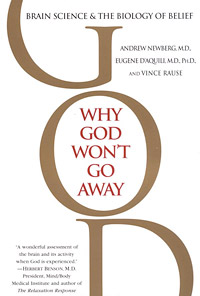If the brain mediates all experience, then paranormal phenomena are nothing more than neuronal events

Five centuries ago demons haunted our world, with incubi and succubi tormenting victims as they lay asleep. Two centuries ago spirits haunted our world, with ghosts and ghouls harassing sufferers during all hours of the night. This past century aliens haunted our world, with grays and greens abducting captives and whisking them away for probing and prodding. Nowadays people are reporting out-of-body experiences, floating above their beds. What is going on here? Are these elusive creatures and mysterious phenomena in our world or in our minds? New evidence adds weight to the notion that they are, in fact, products of the brain. Neuroscientist Michael Persinger, in his laboratory at Laurentian University in Sudbury, Ontario, for example, can induce all these perceptions in subjects by subjecting their temporal lobes to patterns of magnetic fields. (I tried it myself and had a mild out-of-body experience.) (continue reading…)
read or write comments (5)
Why most scientists do not believe in ESP and psi phenomena
In the first half of the 19th century the theory of evolution was mired in conjecture until Charles Darwin and Alfred Russel Wallace compiled a body of evidence and posited a mechanism — natural selection — for powering the evolutionary machine.
The theory of continental drift, proposed in 1915 by Alfred Wegener, was not accepted by most scientists until the 1960s, with the discovery of midoceanic ridges, geomagnetic patterns corresponding to continental plate movement, and plate tectonics as the driving motor.
Data and theory. Evidence and mechanism. These are the twin pillars of sound science. Without data and evidence, there is nothing for a theory or mechanism to explain. Without a theory and mechanism, data and evidence drift aimlessly on a boundless sea. (continue reading…)
read or write comments (2)
Intuition is the key to knowing
without knowing how you know
Stardate: 1672.1. Earthdate: October 6, 1966. Star Trek, Episode 5, “The Enemy Within.”
Captain James T. Kirk has just beamed up from planet Alpha 177, where magnetic anomalies have caused the transporter to malfunction, splitting Kirk into two beings. One is cool and rational. The other is impulsive and irrational. Rational Kirk must make a command decision to save the crew, but he is paralyzed with indecision, bemoaning to Dr. McCoy: “I can’t survive without him. I don’t want to take him back. He’s like an animal — a thoughtless, brutal animal. And yet it’s me!”
This psychological battle between intellect and intuition was played out in almost every episode of Star Trek in the characters of the ultrarational Mr. Spock and the hyperemotional Dr. McCoy, with Captain Kirk as the near perfect synthesis of both. Thus, I call this balance the Captain Kirk Principle: intellect is driven by intuition, intuition is directed by intellect. (continue reading…)
Comments Off on The Captain Kirk Principle
Rarely does anyone weigh facts
before deciding what to believe
In April 1999, when I was on a lecture tour for my book Why People Believe Weird Things, the psychologist Robert Sternberg attended my presentation at Yale University. His response to the lecture was both enlightening and troubling. It is certainly entertaining to hear about other people’s weird beliefs, Sternberg reflected, because we are confident that we would never be so foolish. But why do smart people fall for such things? Sternberg’s challenge led to a second edition of my book, with a new chapter expounding on my answer to his question: Smart people believe weird things because they are skilled at defending beliefs they arrived at for non-smart reasons. (continue reading…)
read or write comments (22)
A review of Andrew Newberg, Eugene D’Aquili, and Vince Rause’s Why God Won’t Go Away: Brain Science and the Biology of Belief.
About ten years ago I began research on the question of why people believe in God, I asked a colleague in a religious studies program to recommend the latest path-breaking scientific work in this area. (continue reading…)
read or write comments (31)






